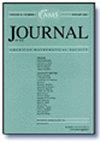On the meromorphic continuation of Eisenstein series
IF 3.2
1区 数学
Q1 MATHEMATICS
引用次数: 4
Abstract
Eisenstein series are ubiquitous in the theory of automorphic forms. The traditional proofs of the meromorphic continuation of Eisenstein series, due to Selberg and Langlands, start with cuspidal Eisenstein series as a special case, and deduce the general case from spectral theory. We present a “soft” proof which relies only on rudimentary Fredholm theory (needed only in the number field case). It is valid for Eisenstein series induced from an arbitrary automorphic form. The proof relies on the principle of meromorphic continuation. It is close in spirit to Selberg’s later proofs.关于爱森斯坦级数的亚纯延拓
爱森斯坦级数在自同构形式理论中无处不在。传统的关于爱森斯坦级数亚纯延拓的证明,由于Selberg和Langlands的存在,都是从cuspidal Eisenstein级数作为特例出发,从谱理论推导出一般情况。我们提出了一个“软”证明,它仅依赖于基本的Fredholm理论(仅在数域情况下需要)。它对任意自同构形式导出的爱森斯坦级数是有效的。该证明依赖于亚纯延拓原理。它在精神上接近塞尔伯格后来的证明。
本文章由计算机程序翻译,如有差异,请以英文原文为准。
求助全文
约1分钟内获得全文
求助全文
来源期刊
CiteScore
7.60
自引率
0.00%
发文量
14
审稿时长
>12 weeks
期刊介绍:
All articles submitted to this journal are peer-reviewed. The AMS has a single blind peer-review process in which the reviewers know who the authors of the manuscript are, but the authors do not have access to the information on who the peer reviewers are.
This journal is devoted to research articles of the highest quality in all areas of pure and applied mathematics.

 求助内容:
求助内容: 应助结果提醒方式:
应助结果提醒方式:


